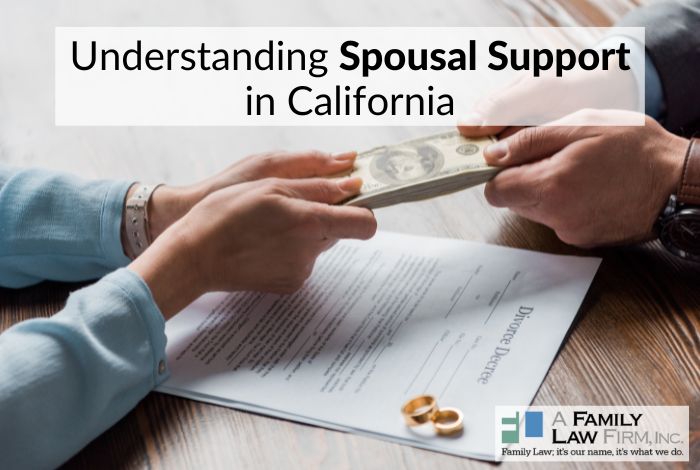
Untangling the Knot: Understanding Spousal Support in California
Divorce can be a complex and emotional journey, especially when it comes to the division of assets and financial matters.
One crucial aspect that often arises during this process is spousal support, which refers to the financial assistance provided by one spouse to the other after separation or divorce.
The laws regarding spousal support in California are designed to ensure fairness and economic stability for both parties involved.
Understanding the intricacies of spousal support in California is essential for divorcing couples and individuals who will soon be navigating the post-marriage landscape.
And by gaining a solid understanding of California spousal support laws, you’ll be better equipped to make informed decisions, seek fair resolutions, and approach your divorce proceedings or post-divorce financial arrangements with greater confidence and clarity during this challenging chapter of your life.
So, whether you’re contemplating a divorce, currently going through the process, asking yourself, “What is spousal support?” or simply seeking to expand your knowledge on the topic, then you should definitely keep reading.
Because in this article, we’re going to delve into the factors that influence spousal support in California, explore the different types of support, and outline the guidelines utilized by California courts.
What Is Spousal Support?
Spousal support is a legal obligation that requires one spouse to provide financial assistance to the other spouse after separation or divorce.
In California, spousal support is governed by specific laws and guidelines that aim to ensure fairness and provide economic stability for both parties involved.
Spousal support is typically awarded when there is a significant difference in earning capacity or financial resources between the divorcing spouses, and its purpose is to help the lower-earning or non-earning spouse maintain a standard of living that’s similar to what they enjoyed during the marriage, at least to some extent.
It’s also important to note that spousal support in California can be temporary or long-term, depending on the circumstances. Temporary support may be awarded during the divorce process, whereas long-term support may be ordered after the divorce is finalized.
Spousal support in California can also be modified or terminated under certain conditions, such as changes in income, employment status, or cohabitation with a new partner.
Which Factors Influence Spousal Support in California?

In California, spousal support can be ordered by the court or agreed upon through a mutual agreement between the spouses.
The specific details regarding the spousal support, including the amount and duration of support payments, depend on various factors, including but not limited to:
Length of the Marriage
Generally, the longer the marriage, the more likely it is for spousal support to be awarded, particularly in cases where one spouse has significantly lower income or earning potential.
Income and Earning Capacity
The court considers the income and earning capacity of each spouse when determining spousal support in California. Factors such as education, skills, work experience, and potential for future employment are all taken into account.
Standard of Living During the Marriage
The court aims to maintain a reasonable approximation of the marital standard of living for the supported spouse, considering factors like housing, lifestyle, and general expenses, among other things.
Financial Needs and Obligations
The court also assesses the supported spouse’s reasonable needs, including housing, healthcare, education, and any other relevant financial obligations.
Contributions to the Marriage
The court will also consider the contributions of each spouse during the marriage, including financial contributions, homemaking, child-rearing, and support for the other spouse’s career or education.
In any case, it’s advisable to consult with a qualified attorney or legal professional to understand how California spousal support laws will apply to your specific situation, as individual circumstances can greatly influence the determination of support amounts and duration.
What Are the Different Types of Spousal Support in California?
In California, there are generally three types of spousal support that can be awarded: temporary spousal support, rehabilitative spousal support, and permanent spousal support.
The court will consider various factors, including those listed above, when determining the appropriate type of support to be awarded in a particular case. Here’s an overview of each type:
Temporary Spousal Support
As the name suggests, temporary spousal support is awarded during the divorce process and aims to provide financial assistance to the supported spouse until a final spousal support order is issued.
Temporary support helps maintain the status quo and ensures that both spouses can meet their immediate financial needs while the divorce proceedings are ongoing.
Rehabilitative Spousal Support
Rehabilitative spousal support is intended to assist the supported spouse in acquiring education, training, or skills to become self-supporting.
It is awarded when the court believes that the supported spouse can eventually become financially independent, and is based on several factors, such as the time required for education or training, job market conditions, and the supported spouse’s ability to become self-supporting.
Permanent Spousal Support
Permanent spousal support does not necessarily mean lifelong support. It refers to ongoing support that continues for an indefinite period until further order by the court or until certain events occur, such as the supported spouse’s remarriage or the death of either party.
Permanent support is generally awarded in cases where the supported spouse is unable to achieve financial self-sufficiency due to factors such as age, health, or limited earning capacity.
It’s important to note that the court has discretion in deciding the type and duration of spousal support, and the specific circumstances of each case play a significant role in these determinations.
Spousal support orders can also be modified or terminated in the future if there are substantial changes in circumstances, such as a significant change in income or the supported spouse becoming self-supporting.
What Guidelines Do the Courts Use When Considering Spousal Support in California?

In California, when determining spousal support, courts often refer to guideline calculations as a starting point. While the guidelines are not mandatory, they provide a framework that helps establish a reasonable range for spousal support amounts.
The primary guideline utilized by California courts is the Santa Clara formula, otherwise known as the Santa Clara guideline.
The Santa Clara formula considers a specific percentage of the parties’ respective incomes and takes into account certain factors, including tax implications and the presence of child support obligations.
This formula takes 40 percent of the higher-earning spouse’s net monthly income and then subtracts 50 percent of the lower-earning spouse’s net monthly income from it in order to determine the cost of spousal support payments.
It’s important to note that this formula is typically applied to marriages where the combined income of both spouses is under a certain threshold (commonly referred to as the cut-off amount). If the combined income exceeds the cut-off amount, the court has more discretion in determining spousal support, and additional factors may come into play.
However, it’s crucial to understand that the guideline calculations are just a starting point, and the court will also consider various factors specific to the case before making a final determination, including:
- The standard of living during the marriage
- The length of the marriage
- The age and health of each spouse
- The earning capacity and job market opportunities for each spouse
- Contributions made by each spouse to the marriage, including child-rearing and homemaking
- The needs and financial resources of each spouse
- Any documented history of domestic violence
These factors, among many others, allow the court to make a fair and equitable determination of spousal support based on the unique circumstances of the case.
At any rate, it’s important to consult with a qualified attorney or legal professional, like a spousal support lawyer in Sonoma County, in order to fully understand how the guidelines and other relevant factors may apply to your specific situation. They can provide personalized advice and help you navigate the spousal support process in California.
Are you looking for a spousal support lawyer in Sonoma County? Contact us today to find out more about how we can help.